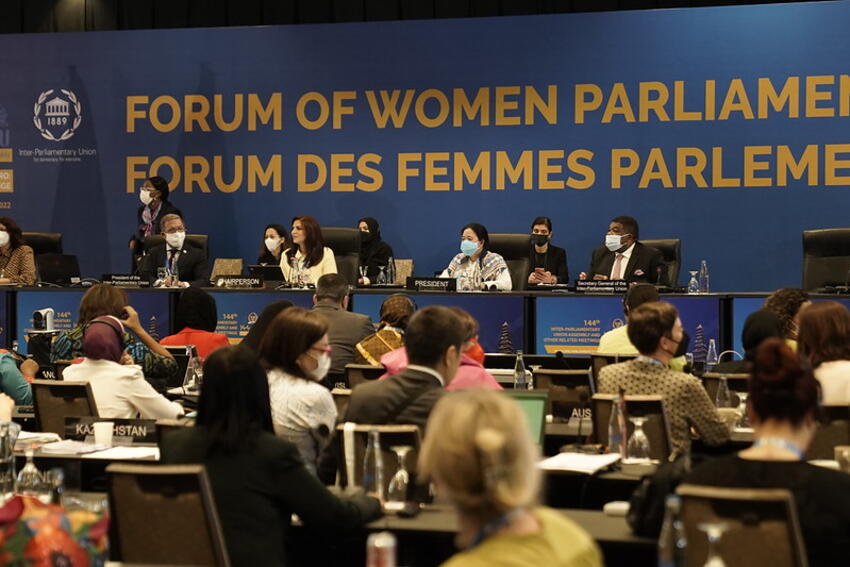Sub-Saharan Africa: Two steps forward, one step back
At the beginning of 2024, the share of women in parliaments across sub-Saharan Africa was 27.3%, a 0.8-percentage-point increase relative to 12 months previously and the third highest among all regions in the world.
In sub-Saharan Africa, elections were held in 2023 for 18 chambers in 13 countries. On average, 19.1% of those elected across the region were women – an increase of 3.9 percentage points when compared with women’s representation following the previous renewals for these same chambers. This was the biggest increase recorded across all regions in the world in 2023.
Overall, women’s representation increased in 11 chambers, with some of the biggest gains recorded in Eswatini (upper chamber), Benin and Sierra Leone. In four chambers, women’s representation remained the same (or changed by 1 percentage point or less), while the share of women MPs fell in three chambers: Guinea-Bissau, Liberia (lower chamber) and Nigeria (upper chamber).
Across the 13 countries that held renewals in 2023, the highest shares of women elected to parliament were recorded in the upper chambers of Zimbabwe (45%) and Eswatini (43.3%).
By contrast, Nigeria elected the least gender-representative parliament in the region, with women making up only 2.8% of MPs in the upper chamber and 3.9% of MPs in the lower chamber following the 2023 polls.
A notable development was the appointment of Manuela Roka Botey as the first female prime minister of Equatorial Guinea. She became the first woman to hold this position in the entire West African region.
Decisive steps forward
Sierra Leone in January 2023 enacted the Gender Equality and Women’s Empowerment Act, which introduced a mandatory 30% quota for women among election candidates. A few months later – in July 2023 – the country held its first election with the new quota in place. A total of 41 women were returned to parliament across the 135 seats that were up for election, representing 30.4% of directly elected MPs following the renewal.
In Benin, 28 women were elected to parliament, a historic high for the country. Together, they accounted for over one quarter (25.7%) of all MPs, a jump of 18.5 percentage points versus the situation following the previous polls. This significant increase was the product of a constitutional amendment and the subsequent introduction of a new electoral code in 2019, which added 24 reserved seats for women in parliament. At the beginning of 2023, Benin ranked 169th in the world in terms of women’s parliamentary representation. By the end of the year, it had moved up to 87th position.
In Nigeria, women’s representation in the Senate (the upper chamber), which was already extremely low, shrank further by 3.7 percentage points in 2023. Only three women were elected in 2023, together representing just 2.8% of the total membership of the chamber. Women also remained vastly underrepresented in the House of Representatives (the lower chamber): in 2023, just 14 women were elected to the 358-seat chamber, accounting for 3.9% of all MPs – marginally higher than the 3.4% share recorded following the previous election.
Nigeria ranked among the bottom five countries globally for women’s representation in parliament. Institutional and sociocultural factors that prevent women in Nigeria from being able to participate in politics on an equal footing. These include gatekeeping by political parties, high candidate registration fees, the inconvenient scheduling of political meetings, the high cost of electoral campaigns, political violence and sexual harassment, clientelism (and, therefore, dependence on narrow networks of men), a ban on independent candidacies, and patriarchal social norms.
In Mauritania, the share of women MPs increased by 3 percentage points following the 2023 election. A total of 41 women were elected, making up 23.3% of MPs – the highest share of female parliamentarians in the country since a record 25.2% women were elected in 2013.
Violence against women in politics
Violence against women in politics remains alarmingly common across the world. Women parliamentarians and electoral candidates face hostility and violence both within parliament and in other political spaces. In an address at the annual meeting of the United Nations Human Rights Council in June 2023, the UN High Commissioner for Human Rights noted that such acts 23 are meant “to perpetuate subordination and to crush the political activism and aspirations of women and girls.”
This violence can take many forms, from misogynistic comments to sexual assault and abuse, and even attacks on women’s lives. While political violence is not new, the digital world has emerged as an additional sphere to attack women in politics.

